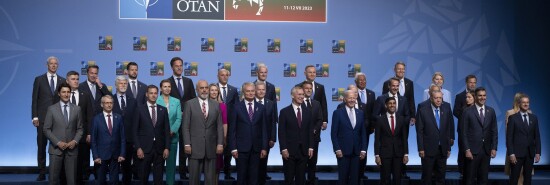
NATO calls out China with summit communique
Tom Rogan
Video Embed
Concluding this year’s leaders summit in Lithuania, NATO’s 31 member states have agreed on a communique that criticizes Communist China’s varied threats.
The statement on Tuesday clearly identifies why many in the alliance are concerned by Beijing’s global activities. As its China-related centerpiece, the communique identifies how the “People’s Republic of China’s (PRC) stated ambitions and coercive policies challenge our interests, security and values.”
UNLIKE MANY OTHERS, NATO SUMMIT HOST LITHUANIA IS AN IDEAL US ALLY
The document laments how Beijing remains “opaque about its strategy, intentions and military build-up. The PRC’s malicious hybrid and cyber operations and its confrontational rhetoric and disinformation target Allies and harm Alliance security. The PRC seeks to control key technological and industrial sectors, critical infrastructure, and strategic materials and supply chains. It uses its economic leverage to create strategic dependencies and enhance its influence. It strives to subvert the rules-based international order, including in the space, cyber and maritime domains.”
This is an important collective rejection of Beijing’s oft-stated claim that it views economic engagement as a reciprocally beneficial endeavor. The reality, as noted here, is that Beijing uses economic activity only as a conduit to fulfill its unilateralist political agenda.
Referencing China’s patently unlawful effort to turn the South China Sea into its own private swimming pool, the statement adds that “we will stand up for our shared values and the rules-based international order, including freedom of navigation.” Importantly, NATO also pushes back against China’s claim that its close relationship with Moscow is compatible with its claims of seeking only “win-win cooperation” with the European Union.
NATO calls on China not to provide lethal aid to Russia and to end its equivocation on Russia’s war. The member states also “call on the PRC to play a constructive role as a permanent member of the United Nations Security Council, to condemn Russia’s war of aggression against Ukraine.” This latter point is key in its repudiation of Beijing’s propaganda narrative that it is a responsible member of the U.N. community that values national sovereignty above all else. China cannot credibly make this claim where, as now, it provides political and economic cover for Russia’s war to end Ukrainian sovereignty.
Finally, the alliance notes how “the PRC is rapidly expanding and diversifying its nuclear arsenal … while failing to engage in meaningful transparency or good faith efforts to achieve nuclear arms control or risk reduction.” Again, this nuclear activity is incompatible with Beijing’s assertion that it values open international dialogue and trust-building measures. On the contrary, the nuclear program of the People’s Liberation Army threatens the stability of the entire planet.
Top line: This statement is surprisingly strong.
CLICK HERE TO READ MORE FROM THE WASHINGTON EXAMINER
After all, there is simply no way that German Chancellor Olaf Scholz and French President Emmanuel Macron were comfortable with this level of detailed criticism of China. Macron has worked particularly hard to qualify previous communique criticisms of China, most recently at the G7 summit in May. And when it comes to China policy, Hungary’s Viktor Orban is little more than a viceroy for Beijing in Europe. These leaders heavily shape their rhetoric on China so as to earn Beijing’s trade and investment favor. That they agreed to this communique suggests that their position is increasingly isolated from that of their fellow allies. That is good news.
It is good news for a simple reason. Namely, that China poses a singularly exceptional threat to international peace and the democratic rule of law. A singular threat to that which has made the world (China very much included) so much more comparatively peaceful and prosperous since 1945. We must contend with that threat.
